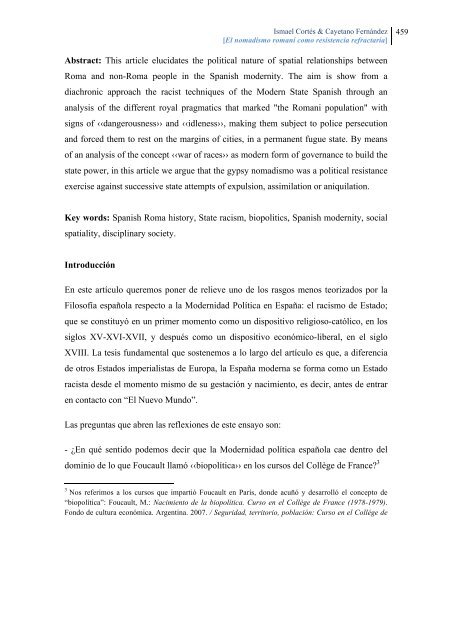Create successful ePaper yourself
Turn your PDF publications into a flip-book with our unique Google optimized e-Paper software.
<strong>Ismael</strong> <strong>Cortés</strong> & <strong>Cayetano</strong> <strong>Fernández</strong><br />
[El nomadismo romaní como resistencia refractaria]<br />
459<br />
Abstract: This article elucidates the political nature of spatial relationships between<br />
Roma and non-Roma people in the Spanish modernity. The aim is show from a<br />
diachronic approach the racist techniques of the Modern State Spanish through an<br />
analysis of the different royal pragmatics that marked "the Romani population" with<br />
signs of ‹‹dangerousness›› and ‹‹idleness››, making them subject to police persecution<br />
and forced them to rest on the margins of cities, in a permanent fugue state. By means<br />
of an analysis of the concept ‹‹war of races›› as modern form of governance to build the<br />
state power, in this article we argue that the gypsy nomadismo was a political resistance<br />
exercise against successive state attempts of expulsion, assimilation or aniquilation.<br />
Key words: Spanish Roma history, State racism, biopolitics, Spanish modernity, social<br />
spatiality, disciplinary society.<br />
Introducción<br />
En este artículo queremos poner de relieve uno de los rasgos menos teorizados por la<br />
Filosofía española respecto a la Modernidad Política en España: el racismo de Estado;<br />
que se constituyó en un primer momento como un dispositivo religioso-católico, en los<br />
siglos XV-XVI-XVII, y después como un dispositivo económico-liberal, en el siglo<br />
XVIII. La tesis fundamental que sostenemos a lo largo del artículo es que, a diferencia<br />
de otros Estados imperialistas de Europa, la España moderna se forma como un Estado<br />
racista desde el momento mismo de su gestación y nacimiento, es decir, antes de entrar<br />
en contacto con “El Nuevo Mundo”.<br />
Las preguntas que abren las reflexiones de este ensayo son:<br />
- ¿En qué sentido podemos decir que la Modernidad política española cae dentro del<br />
dominio de lo que Foucault llamó ‹‹biopolítica›› en los cursos del Collège de France? 3<br />
3<br />
Nos referimos a los cursos que impartió Foucault en París, donde acuñó y desarrolló el concepto de<br />
“biopolítica”: Foucault, M.: Nacimiento de la biopolítica. Curso en el Collège de France (1978-1979).<br />
Fondo de cultura económica. Argentina. 2007. / Seguridad, territorio, población: Curso en el Collége de


